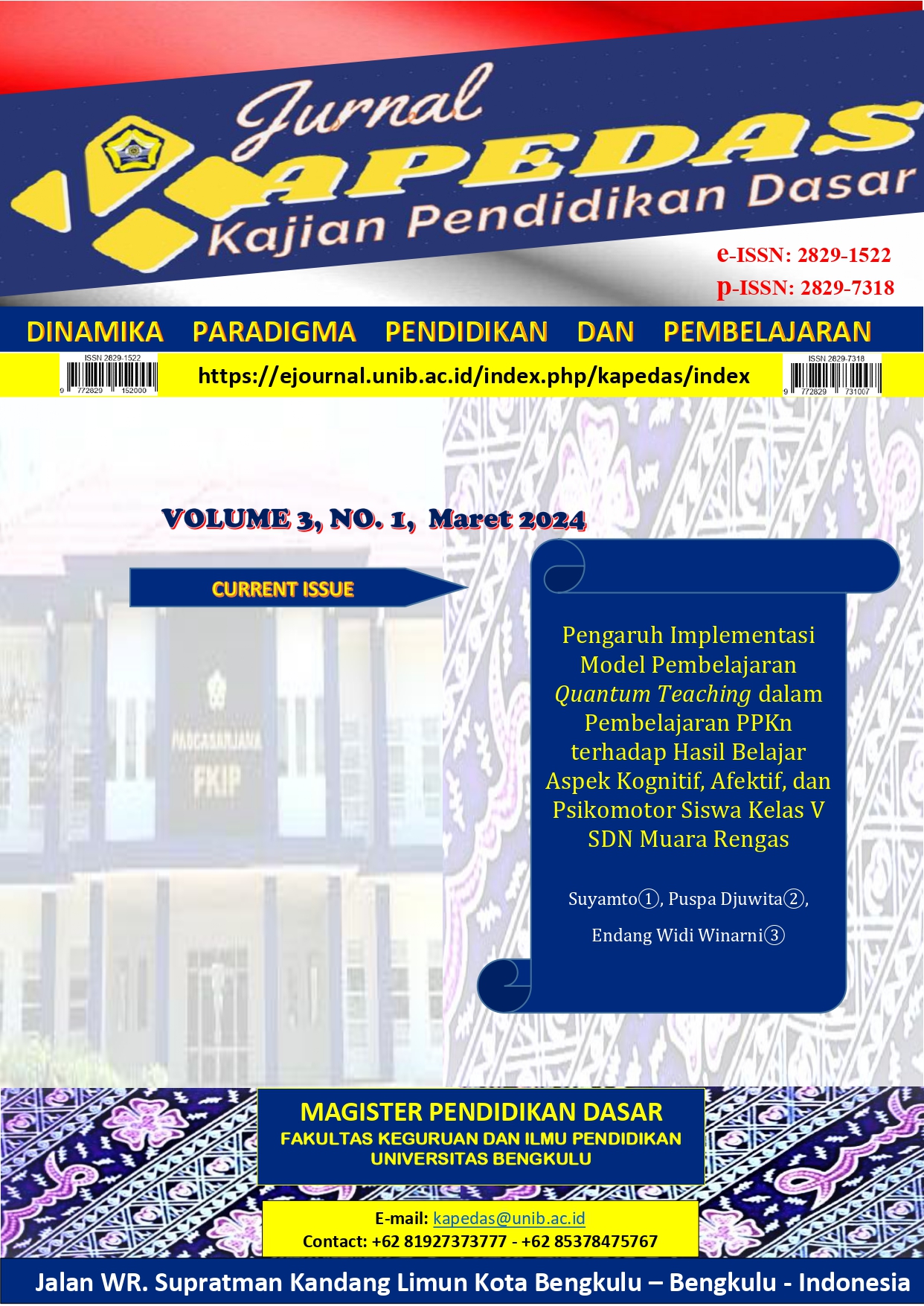Main Article Content
Abstract
This study aims to study the effect of the RME approach on conceptual understanding and problem-solving abilities in class IV MI Plus flats at Nur Rahma Bengkulu City. This research is a quantitative research with experimental method. The sample in this study were MI Plus Nur Rahma students from Bengkulu City, totaling 24 students in class IV Darussalam as the control class, and 24 students in class IV Naim as the experimental class. The instruments used in this research were concept comprehension test questions and problem solving ability test questions in the form of essay questions through the pretest and posttest. The data analysis technique in this study was expert validation analysis using Aiken's V, as well as quantitative analysis using the t-test. From the research results it is known that the results of material, construction and language validation are feasible to use in research. Based on the results of hypothesis 1 t test, the value of sig. (2-tailed) 0.00 is smaller than the significant level (α) 0.05, then H0 is rejected and Ha is accepted so that it can be interpreted that there is an effect of the RME approach on the ability to understand mathematical concepts of class IV MI Plus Nur Rahma Bengkulu City. While the t test hypothesis 2 sig. (2-tailed) 0.02 smaller than the significant level (α) 0.05 then H0 is rejected and Ha is accepted. Based on the test, the N-gain score from the application of the RME approach is higher than the conventional approach, so it can be interpreted that there is an influence of the RME approach on the problem solving ability of MI Plus Nur Rahma, Bengkulu City.
Article Details
Copyright (c) 2024 Eci Anita Lestari, Agus Susanta, Endang Widi Winarni

This work is licensed under a Creative Commons Attribution-ShareAlike 4.0 International License.

Karya ini dilisensikan di bawah Creative Commons Attribution-ShareAlike 4.0 International License .
References
-
Anggraini, Reri S & Ahmad F. (2020). The Effect of Realistic Mathematics Education Approach on Mathematical Problem Solving Ability. EDUMATIKA:Jurnal Riset Pendidikan Matematika. e-ISSN 2620-8911p-ISSN 2620-8903. Volume 3, Nomor 2.
Arikunto, S. (2014). Prosedur Penelitian, Suatu Pendekatan Praktik. Jakarta: Rineka Cipta
Hendriana, H., Rohaeti, E.E., Sumarmo, U,. (2017). Hard Skill dan Soft Skill Matematik Siswa. Bandung: Refika Aditama
Heruman. (2010). Model Pembelajaran Matematika di Sekolah Dasar. Bandung: PT Remaja Rosdakarya
Lestaria, L. & Edy S. (2017). The Effectiveness of Realistic Mathematics Education Approach on Ability of Students’ Mathematical Concept Understanding. International Journal of Sciences: Basic and Applied Research (IJSBAR). ISSN 2307-4531.
Ma’rufi., Pasandaran, R. F., & Yogi, A. (2018). Pemahaman Konsep Geometri Mahasiswa Berdasarkan Gaya Kognitif Mahasiswa. Proximal Jurnal Penelitian Matematika dan Pendidikan Matematika, 1(2), 56–67.
Nurjamaludin D. G., R K Adireja & N Alani. (2020). Realistic Mathematics Education (RME) approach to increase student’s problem solving skill in elementary school. Journal of Physics: Conference Series. 1987 (2021) 012034 IOP Publishing doi:10.1088/1742-6596/1987/1/012034.
Septriyana Y, Ahmad F, & Riska A. (2018). The Influence of Realistic Mathematics Education (RME) Approach on Students’ Mathematical Problem Solving Ability. Advances in Social Science, Education and Humanities Research, volume 178.
Shoimin, A. (2014) 68 Model Pembelajaran Inovatif Dalam Kurikulum 2013, Yogyakarta : AR-RUZZ MEDIA.
Susanto, A. (2013). Teori Belajar Dan Pembelajaran Di Sekolah Dasar. Jakarta: Kencana.
Taufina, Ahmad F, Chandra, & Muhammad I. S. (2019). Development of Statistics in Elementary School Based RME Approach with Problem Solving for Revolution Industry 4.0. Advances in Social Science, Education and Humanities Research, volume 382.
Wijaya, A. (2014). Pendidikan Matematika Realistic. Yogyakarta: Graha Ilmu.
References
Arikunto, S. (2014). Prosedur Penelitian, Suatu Pendekatan Praktik. Jakarta: Rineka Cipta
Hendriana, H., Rohaeti, E.E., Sumarmo, U,. (2017). Hard Skill dan Soft Skill Matematik Siswa. Bandung: Refika Aditama
Heruman. (2010). Model Pembelajaran Matematika di Sekolah Dasar. Bandung: PT Remaja Rosdakarya
Lestaria, L. & Edy S. (2017). The Effectiveness of Realistic Mathematics Education Approach on Ability of Students’ Mathematical Concept Understanding. International Journal of Sciences: Basic and Applied Research (IJSBAR). ISSN 2307-4531.
Ma’rufi., Pasandaran, R. F., & Yogi, A. (2018). Pemahaman Konsep Geometri Mahasiswa Berdasarkan Gaya Kognitif Mahasiswa. Proximal Jurnal Penelitian Matematika dan Pendidikan Matematika, 1(2), 56–67.
Nurjamaludin D. G., R K Adireja & N Alani. (2020). Realistic Mathematics Education (RME) approach to increase student’s problem solving skill in elementary school. Journal of Physics: Conference Series. 1987 (2021) 012034 IOP Publishing doi:10.1088/1742-6596/1987/1/012034.
Septriyana Y, Ahmad F, & Riska A. (2018). The Influence of Realistic Mathematics Education (RME) Approach on Students’ Mathematical Problem Solving Ability. Advances in Social Science, Education and Humanities Research, volume 178.
Shoimin, A. (2014) 68 Model Pembelajaran Inovatif Dalam Kurikulum 2013, Yogyakarta : AR-RUZZ MEDIA.
Susanto, A. (2013). Teori Belajar Dan Pembelajaran Di Sekolah Dasar. Jakarta: Kencana.
Taufina, Ahmad F, Chandra, & Muhammad I. S. (2019). Development of Statistics in Elementary School Based RME Approach with Problem Solving for Revolution Industry 4.0. Advances in Social Science, Education and Humanities Research, volume 382.
Wijaya, A. (2014). Pendidikan Matematika Realistic. Yogyakarta: Graha Ilmu.
